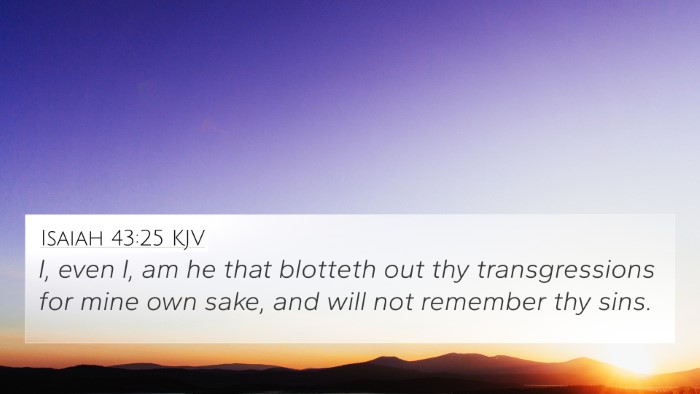Ezekiel 33:16 Meaning and Interpretation
Ezekiel 33:16 states, "None of his sins that he has committed shall be remembered against him; he has done what is lawful and right; he shall surely live." This verse emphasizes the theme of repentance, justice, and the faithfulness of God in offering forgiveness to those who truly turn from their sin.
Understanding the Context
The Book of Ezekiel is a prophetic work that addresses the people of Israel during the Babylonian exile. This passage is part of a broader message about the responsibility of the watchman and the call for individuals to turn from wickedness. God, through Ezekiel, reassures His people that true repentance restores them to a state of grace.
Key Insights from Commentaries
- Matthew Henry: Henry expounds that this verse illustrates God's merciful nature, emphasizing that genuine repentance is met with divine grace. He highlights how justice is accomplished, not by punishing the penitent, but by willing to forgive their transgressions.
- Albert Barnes: Barnes notes that the context of this promise includes both individual and corporate repentance. He underscores that God's mercy does not ignore sin but acknowledges a change of heart that grants forgiveness and restoration to life.
- Adam Clarke: Clarke points out the profound assurance given here—that when one is justified through righteous acts, their past sins are not imputed to them. The focus is on practical righteousness over mere ritual, suggesting that true faith manifests in action.
Theological Themes
This verse embodies several theological themes:
- Grace and Forgiveness: It showcases God's readiness to forgive those who turn from sin.
- Repentance: Emphasizes the need for a heartfelt turning away from wrongdoing.
- Righteousness: Highlights that living justly is paramount to receiving life in God’s kingdom.
Cross-References for Ezekiel 33:16
The following Bible verses provide deeper insights and connections relevant to Ezekiel 33:16:
- Ezekiel 18:30: Calls Israel to repent from all offenses to find life.
- Acts 3:19: Encourages repentance for the forgiveness of sins.
- Romans 6:23: Discusses the gift of eternal life in contrast to the wages of sin.
- 2 Chronicles 7:14: Promises healing and forgiveness to a humble and repentant people.
- 1 John 1:9: Affirms that confessing sins leads to cleansing and forgiveness.
- Luke 15:7: Celebrates the joy in heaven over one sinner who repents.
- John 3:16: Proclaims God's love and the promise of everlasting life through belief.
- Isaiah 55:7: Urges the wicked to forsake their ways and receive mercy.
- Psalm 103:12: Illustrates how far God removes our transgressions from us.
- Hebrews 10:17: Reaffirms that God remembers our sins no more.
Importance of Cross-Referencing
Understanding Ezekiel 33:16 in the light of other verses is essential for grasping its full meaning. Here are some points on the value of cross-referencing:
- It helps identify Bible verse connections that enhance comprehension of God's nature.
- Allows for comparative Bible verse analysis to see how themes of justice and mercy are developed throughout Scripture.
- Create a broader thematic connection highlighting God’s offer of forgiveness across both Old and New Testaments.
- Cross-referencing aids in sermon preparation and teaches on doctrines of salvation and grace.
Conclusion
Ezekiel 33:16 provides a profound insight into the relationship between sin, repentance, and forgiveness. By applying tools for Bible cross-referencing, one can see the rich inter-Biblical dialogue that reveals God's unwavering commitment to offer life to those who return to Him. This understanding invites believers to deepen their relationship with God through genuine repentance and pursuit of righteousness.










